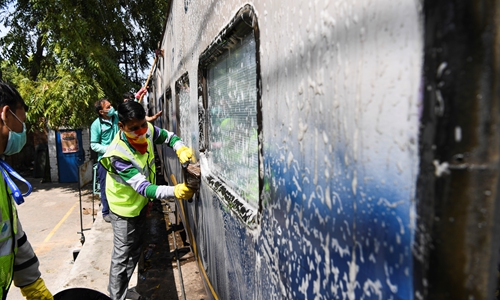HOME >> WORLD
India needs tighter measures to combat COVID-19: experts
By Li Aixin Source:Globaltimes.cn Published: 2020/3/24 1:06:44

Railway workers clean the exterior of a train carriage as a preventive measure against COVID-19 at a yard in New Delhi, India on Monday. Photo: AFP
To stop the spread of the novel coronavirus (COVID-19), New Delhi closed its borders on Monday, a move that will remain in effect throughout March following a nationwide curfew issued Sunday. As observers believe such measures are necessary, they are not enough to cope with the various challenges to contain the virus.
At least 75 districts where COVID-19 infections have been reported are under lockdown. Inter-state transportation has been suspended nationwide beginning Monday along with the lockdown of New Delhi, home to 20 million people.
"Social distancing is becoming a reality," Aravind Yelery, senior fellow at HSBC Business School and Peking University, who lives in Pune, India, told the Global Times, while noting Indians are more social, and public gatherings are an essential part of their culture. Thus, measures like lockdowns and curfews are just one way to enforce discipline and raise awareness, Yelery said.
The Indian government banned international flights for one week beginning Sunday. Before that, many Indians had returned home from overseas, with airports across the country packed with Indians who had previously lived abroad, Yelery explained.
Yet analysts are concerned that isolating cities, or the entire country right now is too late since the virus has already started spreading throughout India, the world's second most populous country.
There were flaws at the early stages of the country's epidemic prevention and control efforts, Long Xingchun, director of the Center for Indian Studies at China West Normal University told the Global Times. India did not implement tests or quarantine to all international arrivals like China.
"It means India's coronavirus cases might be higher than official figures," Long said.
As of Monday evening, the number of COVID-19 cases surged to 419 in India, with the death toll rising to eight.
On Saturday, India reported its first case of a slum resident who tested positive for COVID-19. People who live in slums, which are highly populated, are also extremely poor and cannot afford to see a doctor when they are sick, one analyst noted, and they believe it means any infectious disease could spread rapidly there.
If the government fails to take decisive measures toward potential infections throughout the country's slums, the result could be disastrous, Long said.
Indians are aware that to keep the epidemic under control, it is essential to trace and isolate potential virus carriers. "Many Indian states have implemented precautionary measures to enforce lockdowns and reduce the possibility of a widespread outbreak," noted Yelery, yet observers also noted that despite India's system in actively combating the virus, it does indicate "near-to-breakdown" pressure.
"This is because India has fewer doctors and clinics in proportion to its population and health centers do not have adequate resources to deal with large-scale emergencies," said Yelery.
The underdeveloped telecommunication and community network also provide challenges to contain the virus.
"It is difficult to carry out epidemiological investigations in the country, not to mention people in the bottom strata have limited access to relevant information on epidemic prevention or awareness," Long noted.
Posted in: CENTRAL & SOUTH ASIA